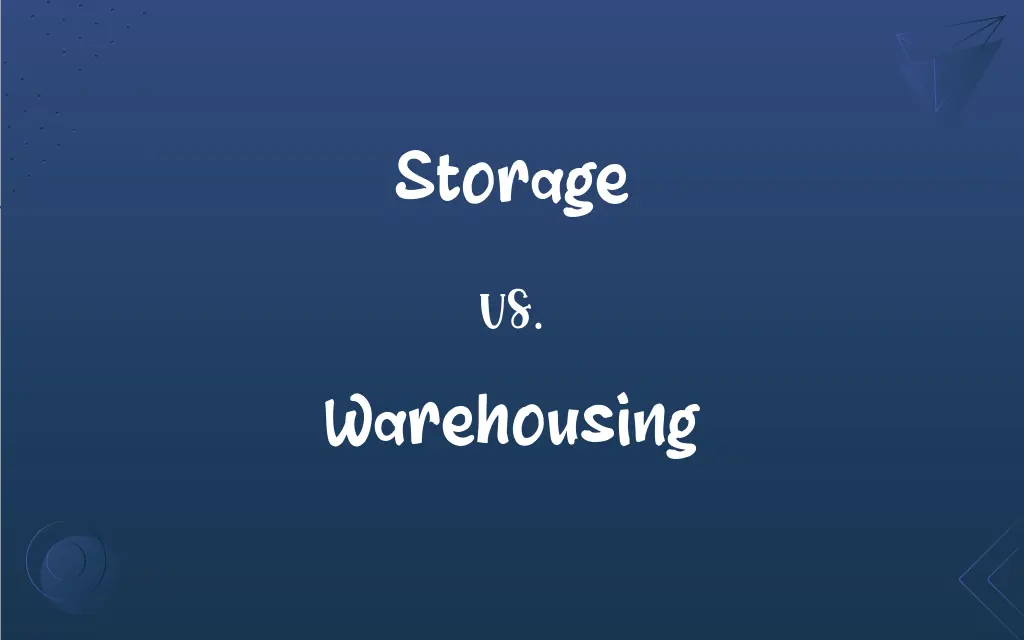Storage vs. Warehousing: What's the Difference?
Edited by Janet White || By Harlon Moss || Published on November 22, 2023
Storage refers to keeping or placing goods in a space for preservation, while warehousing involves the systematic storage, handling, and management of goods within a dedicated facility.

Key Differences
Storage and warehousing are terms often used in the logistics and supply chain industry. Storage is the generic act of keeping or placing goods in a specific space, like a closet, shed, or room, for safekeeping or preservation. It can be short-term or long-term and doesn't necessarily require a system or method. On the other hand, warehousing pertains to a more organized and systematic approach, often within a dedicated facility, to store, handle, and manage goods.
While storage can be seen as a subset of warehousing, it doesn't involve the complexity or intricacies commonly associated with warehousing operations. Warehousing often includes activities such as inventory management, security, order fulfillment, and even sometimes packing and labeling. Storage, in its simplest form, might only involve placing an item in a designated spot.
In terms of scale, storage can be done at any level, from storing books on a shelf at home to keeping goods in a commercial storage unit. Warehousing, however, is often on a much larger scale, involving thousands to millions of items stored in large facilities, often with advanced technological systems for tracking and management.
Another key distinction between storage and warehousing is the professional involvement. While storage can be a personal act, warehousing typically involves professionals skilled in inventory management, logistics, and other related fields. This expertise ensures the efficient and organized handling of goods.
Comparison Chart
Definition
Keeping goods in a space.
Systematic storage and management in a facility.
ADVERTISEMENT
Scale
Can be small to large.
Typically on a larger scale.
Complexity
Simple placement of items.
Involves inventory management, order fulfillment, etc.
Duration
Can be short-term or long-term.
Often long-term with systematic tracking.
Professional Involvement
Can be personal or commercial.
Typically involves logistics professionals.
Storage and Warehousing Definitions
Storage
A means to preserve items over time.
Cold storage is essential for certain vaccines.
ADVERTISEMENT
Warehousing
The act of storing goods with the intention of selling or distributing later.
Warehousing allows retailers to have stock ready for peak seasons.
Storage
The capacity to retain data or information.
His computer has a storage of 1TB.
Warehousing
Operations related to inventory management, packing, and dispatch.
Their warehousing efficiency has reduced delivery times.
Storage
The act of placing items in a space for safekeeping.
She rented a unit for her furniture storage.
Warehousing
A dedicated facility for storing large quantities of products.
The new warehousing facility can handle thousands of products.
Storage
Keeping items for future use or reference.
The storage of archival documents is crucial.
Warehousing
The professional and organized storage of items.
Companies invest heavily in warehousing technology.
Storage
An area or container where items are placed.
She keeps her shoes in the storage closet.
Warehousing
The systematic handling and storing of goods in a facility.
Warehousing plays a crucial role in the supply chain.
Storage
The act of storing goods or the state of being stored.
Warehousing
A place in which goods or merchandise are stored; a storehouse.
Storage
A space for storing goods.
FAQs
Are storage and warehousing the same?
No, storage is simply keeping goods, while warehousing is the organized handling and storage in a facility.
Can I use my basement for storage?
Yes, basements can be used for storage, but ensure items are protected from potential damage.
Is warehousing only for large businesses?
No, businesses of all sizes may need warehousing, depending on their storage and distribution needs.
Can a garage be considered warehousing?
Typically, a garage is for storage. Warehousing involves more systematic management in dedicated facilities.
Which requires more professional expertise, storage or warehousing?
Warehousing, as it often involves logistics professionals for management.
Is a bookshelf an example of storage?
Yes, a bookshelf is a form of storage for books.
Is a refrigerator a storage device?
Yes, a refrigerator is a storage device for perishable items.
What's the primary function of warehousing?
Warehousing serves to systematically store, manage, and distribute goods.
Does storage always require containers?
No, storage can be without containers, as long as items are kept in a designated space.
Can digital data be kept in storage?
Yes, digital data can be kept in electronic storage like hard drives or cloud storage.
What are the primary activities in warehousing?
Inventory management, security, order fulfillment, packing, and sometimes labeling.
Why is warehousing crucial for e-commerce businesses?
Warehousing ensures e-commerce businesses can efficiently manage, store, and dispatch goods to customers.
How does technology impact warehousing?
Technology improves warehousing efficiency through inventory tracking, automation, and better logistics management.
How does warehousing benefit supply chains?
Warehousing ensures efficient storage, management, and distribution of goods, improving supply chain reliability and speed.
Do homes have storage?
Yes, homes often have storage spaces like closets, attics, basements, and garages.
Is warehousing only about storage?
No, warehousing includes storage but also involves handling, management, and sometimes distribution.
Can storage be rented?
Yes, there are commercial storage units available for rent for various needs.
Do all retail stores have warehousing facilities?
Not all, but many larger retail stores or chains have warehousing facilities for stock management.
Does warehousing always involve large facilities?
Often, but not always. The scale of warehousing depends on the business's needs.
Can storage include digital spaces?
Absolutely, storage can refer to both physical and digital spaces.
About Author
Written by
Harlon MossHarlon is a seasoned quality moderator and accomplished content writer for Difference Wiki. An alumnus of the prestigious University of California, he earned his degree in Computer Science. Leveraging his academic background, Harlon brings a meticulous and informed perspective to his work, ensuring content accuracy and excellence.
Edited by
Janet WhiteJanet White has been an esteemed writer and blogger for Difference Wiki. Holding a Master's degree in Science and Medical Journalism from the prestigious Boston University, she has consistently demonstrated her expertise and passion for her field. When she's not immersed in her work, Janet relishes her time exercising, delving into a good book, and cherishing moments with friends and family.































































